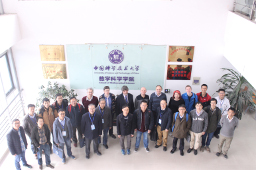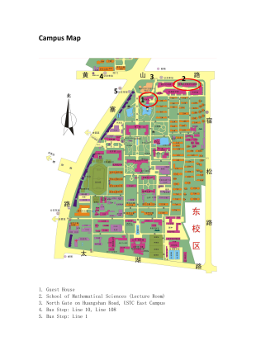Workshop on Gromov-Witten Theory and Integrable Hierarchies
Nov 16 - 19, 2017. School of Mathematical Sciences, University of Science and Technology of China.
We plan to organize a weekend workshop on Gromov-Witten invariants and integrable hierarchies from Nov 16 to Nov 19 in School of Mathematical Sciences of University of Science and Technology of China. The aim of this workshop is to discuss some new progress in the above two areas, and the possible connections between them and other areas in mathematical physics.
Schedule
| Time | Nov 17 | Nov 18 | Nov 19 |
|---|---|---|---|
| 8:30 ~ 9:15 | Iskander Taimanov | Jian Zhou | Bohan Fang |
| 9:20 ~ 10:05 | Si Li | Andrey Mironov | Minxin Huang |
| 10:05 ~ 10:25 | Tea break | ||
| 10:25 ~ 11:10 | Senyue Lou | Baosen Wu | Maxim Pavlov |
| 11:15 ~ 12:00 | Li Sheng | Zhengyu Zong | |
| 12:00 ~ 14:00 | Lunch break | ||
| 14:00 ~ 14:45 | Aleksandr Smirnov | Xiaochuan Liu | |
| 14:50 ~ 15:35 | Xiangke Chang | Chao-Zhong Wu | |
| 15:35 ~ 15:55 | Tea break | ||
| 15:55 ~ 16:40 | Alexander Zheglov | Xiaojun Chen | |
Titles and Abstracts
|
Speaker: Xiangke Chang (Chinese Academy of Sciences)
Title: Several peakon and Toda lattices Abstract: In this talk, I'll introduce some recent results on peakon, Toda lattices, and orthogonal polynomials. |
|
Speaker: Xiaojun Chen (Sichuan University)
Title: Calabi-Yau algebras and noncommutative symplectic geometry Abstract: In 2012, Pantev, Toën, Vaquié and Vezzosi introduced the notion of shifted symplectic structures for derived stacks. This not only generalizes the classical symplectic geometry to a much broader context, but also reveals many new features on a lot of geometric spaces, especially on the various moduli spaces that mathematicians are now studying. As remarked by the authors, the shifted symplectic structure, if it exists, always comes from the Poincare duality of the corresponding source spaces; they also outlined how to generalize the shifted symplectic structure to non-commutative spaces, such as Calabi-Yau categories. In this talk, we focus on a special class of non-commutative Calabi-Yau spaces, namely Calabi-Yau algebras, and show that for a Koszul Calabi-Yau algebra, there is a noncommutative shifted symplectic structure, which is also called the shifted bi-symplectic structure, on the cobar construction of its Koszul dual coalgebra adjoining a co-unit. Such shifted bi-symplectic structure naturally induces a shifted symplectic structure on the corresponding differential graded (DG) representation schemes, and also induces a shifted Poisson structure on the derived representation schemes of the Calabi-Yau algebra. Joint work with F. Eshmatov. |
|
Speaker: Bohan Fang (Peking University)
Title: Oscillatory integrals on T-dual branes and Gamma II for toric Fano varieties Abstract: I will discuss the integrals on the T-dual branes in the Landau-Ginzburg mirror of toric varieties. The results are genus 0 Gromov-Witten descendant potentials. In particular, based on this result and with some input from homological mirror symmetry, I will sketch a proof of Gamma II conjecture, which concerns such potential's asymptotic behavior. |
|
Speaker: Minxin Huang (University of Science and Technology of China)
Title: Refined invariants for Calabi-Yau three-folds and minimal 6d superconformal theories Abstract: 6d superconformal theories are constructed by the building blocks of a finite set of minimal theories. We develop method to compute the elliptic genus of tensionless strings in these minimal theories, using Weyl invariant Jacobi forms of simple Lie algebra. The elliptic genus is related to topological string partition functions and Gromov-Witten invariants of the corresponding Calabi-Yau three-folds. |
|
Speaker: Si Li (Tsinghua University)
Title: Topological string field theory and integrable hierarchy Abstract: We discuss the physics origin of a two-parameter quantum integrable hierarchies associated to Calabi-Yau geometries as a natural quantum gauge symmetry in B-twisted topological string field theory. |
|
Speaker: Xiaochuan Liu (Xi'an Jiaotong University)
Title: Stability of Peakons Abstract: The stability of solitary waves (or solitons) is one of the fundamental qualitative properties of the solutions of nonlinear waves equations. In this talk, I will review some progress on the constructions of the orbital stability of the peaked solitary waves (or peakons) by a direct method of conservation laws; present some recent results for the higher-order Camassa-Holm-type dispersive equations; and investigate the effect on the issue of stability of higher-order nonlinearity. |
|
Speaker: Senyue Lou (Ningbo University)
Title: Four nonequivalent integrable Alice-Bob KdV systems Abstract: Using parity and time reversal symmetries, some nonequivalent integrable nonlocal KdV (Alice-Bob KdV) systems are obtained from the well-known systems such as the Hirota-Satsuma system, the usual KdV equation with source, coupled KdV systems and the dispersive long wave equations. Same idea can be used to find other types of nonlinear nonlocal integral systems. For instance, the AB-Burgers, AB-NLS type, AB-DNLS systems can be obtained from the Kaup-Broer system, the Boussinesq system and the third CLL systems respectively. |
|
Speaker: Andrey Mironov (Sobolev Institute of Mathematics of the Siberian
Branch of the Russian Academy of Sciences)
Title: Billiard and Algebraic Birkhoff conjecture Abstract: We introduce a new dynamical system which we call Angular billiard. It acts on the exterior points of a convex curve in Euclidean plane. In a neighborhood of the boundary curve this system turns out to be dual to the Birkhoff billiard. Using this system we get new results on algebraic Birkhoff conjecture on integrable billiards. The talk is based on the joint paper with M. Bialy (Tel Aviv). |
|
Speaker: Maxim Pavlov (Novosibirsk State University)
Title: Integrability of Exceptional Hydrodynamic Type Systems Abstract: We consider integrable (by the Extended Hodograph Method) multi-component hydrodynamic type systems, which possess just one multiple root of characteristic polynomials of velocity matrices. |
|
Speaker: Li Sheng (Sichuan University)
Title: Virtual Neighborhood Technique and Related Analytic Problems Abstract: TBA |
|
Speaker: Aleksandr Smirnov (St. Petersburg State University of Aerospace
Instrumentation)
Title: Spectral curves for the rogue waves Abstract: In the present work, we calculate spectral curves for quasi-rational solutions of equations from AKNS hierarchy. Also, we found spectral curves for the simplest trigonometric, hyperbolic and elliptic solutions. |
|
Speaker: Iskander Taimanov (Sobolev Institute of Mathematics of the Siberian
Branch of the Russian Academy of Sciences)
Title: The Moutard transformation of Dirac operators and conformal geometry of surfaces in the four-space Abstract: TBA |
|
Speaker: Baosen Wu (Tsinghua University)
Title: Donaldson-Thomas invariant and its degeneration Abstract: Donaldson-Thomas invariants of Calabi-Yau threefolds are holomorphic analogue of Casson invariants of three-dimensional real manifolds. They are also closely related to Gromov-Witten invariants in various ways. I will explain briefly this analogue, the Gromov-Witten/Donaldson-Thomas correspondence. Then I will focus on the degeneration method applying to moduli problem, especially Hilbert schemes. As application, we have the degeneration formula of Donaldson-Thomas invariants. This is joint work with Jun Li. |
|
Speaker: Chao-Zhong Wu (Sun Yat-Sen University)
Title: On string equation and topological solution of Drinfeld-Sokolov hierarchies Abstract: We give a general method to compute the expansion of topological tau functions for Drinfeld-Sokolov hierarchies associated to an arbitrary untwisted affine Kac-Moody algebra. Our method consists of two main steps: first these tau functions are expressed as (formal) Fredholm determinants of the type appearing in the Borodin-Okounkov formula, then the kernels for these determinants are found using a reduced form of the string equation. This is a collaboration with Mattia Cafasso. |
|
Speaker: Alexander Zheglov (Moscow State University)
Title: Quantum integrable systems and torsion free sheaves on algebraic varieties Abstract: I will talk about the correspondence between quantum integrable systems and algebro-geometric spectral data. The most important ingredient of these data are spectral sheaves --- torsion free sheaves of special kind on algebraic varieties. I will also discuss how explicit is this correspondence, in particular, could we produce integrable systems starting from spectral data, even if the spectral variety has dimension greater than one. |
|
Speaker: Jian Zhou (Tsinghua University)
Title: Kepler problem and AdS/CFT correspondence Abstract: Kepler system is one of the first integrable systems. Modern study of the Kepler problem reveals some rich connections with other mathematical objects, for example hidden symmetry of the Kepler system and minimal coadjoint orbits, relationships with Penrose twistor theory and Howe duality, etc. There are also generalization of the Kepler problems, which are related to Jordan algebras and bounded symmetric domains. We will introduce a connection of the Kepler problem with the AdS/CFT correspondence. This leads us to hidden supersymmetry that unites all aspects of the Kepler problem. |
|
Speaker: Zhengyu Zong (Tsinghua University)
Title: Gromov-Witten/Donaldson-Thomas correspondence for local gerby curves Abstract: In 2004 and 2005, the work of Bryan-Pandharipande and Okounkov-Pandharipande build the Gromov-Witten/Donaldson-Thomas correspondence for local curves. In this talk, I will discuss an ongoing project on the Gromov-Witten/Donaldson-Thomas correspondence for local gerby curves, which is an orbifold generalization of the above work. More concretely, we will consider a $\mathbb{Z}_{n+1}$-gerbe $C$ over a smooth genus $g$ curve. Let $L_1$ and $L_2$ be two orbifold line bundles over $C$ such that the isotropy group $\mathbb{Z}_{n+1}$ acts on them via fiberwisely multiplication by $\exp\left(\frac{2\pi i}{n + 1}\right)$ and $\exp\left(-\frac{2\pi i}{n + 1}\right)$ respectively. We will study the Gromov-Witten/Donaldson-Thomas correspondence for the total space of $X := L_1\oplus L_2$. The strategy of the proof is to apply degeneration formula to $X$ to reduce the problem to the case of cap, cylinder, and pair of pants. This work is joint with Zijun Zhou. |

Scientific Committee
Youjin Zhang
Jian Zhou
Organizing Committee
Dafeng Zuo
Hui Ma
Si-Qi Liu
Youjin Zhang
Jian Zhou
Invited Speakers
Xiangke Chang
Xiaojun Chen
Bohan Fang
Minxin Huang
Si Li
Xiaochuan Liu
Senyue Lou
Andrey Mironov
Maxim Pavlov
Li Sheng
Aleksandr Smirnov
Iskander Taimanov
Baosen Wu
Chao-Zhong Wu
Alexander Zheglov
Jian Zhou
Zhengyu Zong
Contact
Dafeng ZuoEmail: dfzuo@ustc.edu.cn Kelei Tian
Email: kltian@ustc.edu.cn
Accommodation
USTC GuesthousePhone: (+86) 0551-63602881
Map
